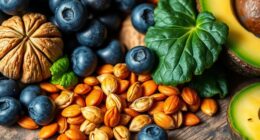Plant-based aquatic ingredients like sea moss, duckweed, and agar-agar offer eco-friendly, nutrient-rich options for your diet and products. You can farm sea moss on sustainable aquaculture farms, harvest duckweed from water bodies with minimal disruption, and produce agar-agar through eco-conscious farming methods. These ingredients help protect marine ecosystems, reduce overfishing, and lower environmental impact. If you want to discover how these sustainable choices support health and the planet, keep exploring.
Key Takeaways
- Sea moss, duckweed, and agar-agar are sustainable, plant-based aquatic ingredients cultivated to reduce environmental impact.
- These ingredients support eco-friendly practices by minimizing wild harvesting and promoting responsible aquaculture.
- Sea moss and agar-agar are farmed in controlled environments, ensuring continuous growth and ecological balance.
- Duckweed grows rapidly with minimal resources, making it a highly sustainable protein and nutrient source.
- Using these ingredients helps preserve marine ecosystems and offers nutritious, eco-conscious alternatives for various industries.

Plant-based aquatic ingredients are gaining popularity as sustainable alternatives to traditional marine products. These ingredients, like sea moss, duckweed, and agar-agar, offer an eco-friendly way to meet nutritional and industrial needs without depleting ocean ecosystems. One of the key reasons they’re becoming mainstream is their sustainability benefits. Unlike wild-caught seafood, which often involves intensive harvesting that can damage marine environments, these plant-based options are typically cultivated using controlled methods. This reduces overfishing and minimizes habitat destruction, helping maintain the delicate balance of aquatic ecosystems. For example, sea moss can be farmed on vertical farms or in designated aquatic farms, making it easier to manage and harvest without disturbing wild populations. When it comes to harvesting techniques, these plants are often gathered through methods that emphasize sustainability. Harvesting sea moss, for instance, involves carefully collecting mature plants without stripping entire beds, ensuring continuous growth and regeneration. Duckweed, which floats on freshwater surfaces, is harvested by skimming or using gentle collection methods that don’t harm the water bodies. Agar-agar, derived from red algae, is usually obtained through sustainable farming practices that focus on minimal environmental impact and efficient extraction processes. These methods contrast sharply with traditional fishing or harvesting of wild marine species, which can cause overexploitation and damage ecosystems. By adopting sustainable harvesting techniques, producers can ensure a reliable supply while protecting natural resources for future generations. Additionally, the growing interest in cryptocurrency’s role in sustainable resource management highlights innovative ways to support eco-friendly practices in aquaculture and harvesting.
Furthermore, cultivating these ingredients often involves renewable practices that lessen the carbon footprint associated with extraction. Sea moss farms, for example, can be established onshore or in coastal waters, using minimal land and water inputs. Duckweed grows rapidly, requiring little space and nutrients, making it an efficient source of biomass with a low environmental impact. Agar-agar production is also increasingly adopting eco-conscious extraction methods, such as cold processing, which reduces energy consumption and preserves the integrity of the product. These practices align with a broader shift towards sustainable food systems and eco-friendly industrial applications.
In essence, shifting to plant-based aquatic ingredients supports environmental health and conserves marine biodiversity. Their sustainable harvesting techniques and benefits make them an attractive choice for consumers and producers alike. By choosing these alternatives, you contribute to reducing overfishing and habitat destruction, fostering a more resilient and sustainable ocean. As awareness grows, so does the importance of supporting responsible cultivation methods that prioritize ecological balance. These ingredients not only serve as nutritious, versatile products but also exemplify how innovative harvesting techniques can promote a healthier planet.
Frequently Asked Questions
How Sustainable Are These Aquatic Ingredients Compared to Land Crops?
You’ll find that aquatic ingredients like sea moss, duckweed, and agar-agar are generally more sustainable than land crops. Their environmental impact is lower because they require less land and water, and they grow quickly, boosting resource efficiency. Plus, they often help preserve ecosystems by reducing deforestation. By choosing these ingredients, you support a more sustainable future with a smaller ecological footprint, making them a smart choice for eco-conscious consumers.
Are There Any Allergies Associated With Sea Moss, Duckweed, or Agar-Agar?
Think of allergies like a maze; you need to find the right path. Sea moss, duckweed, and agar-agar can cause allergies in some people. It’s wise to do allergy testing first, as cross-reactivity concerns may exist with other seaweeds or plants. While generally safe, individual sensitivities vary, so stay cautious and consult your healthcare provider if you’re unsure. Better safe than caught in an allergic trap!
Can These Ingredients Replace Traditional Gelatin in All Recipes?
You can often use sea moss, duckweed, and agar-agar as gelatin alternatives in many culinary applications, but they might not work perfectly in all recipes. Agar-agar, for example, works well in desserts and jellies, while sea moss adds a gel-like texture. However, for recipes requiring the specific properties of gelatin, like certain mousses or desserts, these ingredients may need adjustments or may not be suitable.
What Are the Best Ways to Incorporate These Ingredients Into Daily Diets?
You can supercharge your daily diet by blending Sea Moss into smoothies for a nutrient boost or adding Agar‑Agar to make your savory dishes gel perfectly. Duckweed’s a hidden gem, great in salads or stir-fries, transforming ordinary meals into plant-powered powerhouse creations. Just a spoonful here, a pinch there—these ingredients are your ticket to vibrant health, making every bite an epic step toward wellness!
How Do Harvesting Practices Impact the Environment and Aquatic Ecosystems?
You should be aware that overharvesting impacts aquatic ecosystems, disrupting ecosystem balance and harming marine life. When harvesting sea moss, duckweed, or agar‑agar excessively, it can lead to habitat loss and reduce biodiversity. Sustainable practices are vital; they guarantee these ingredients remain plentiful and ecosystems stay healthy. By choosing responsibly harvested products, you help protect aquatic environments and support long-term ecological stability.
Conclusion
As you explore plant-based aquatic ingredients like sea moss, duckweed, and agar-agar, you’ll discover their versatility and sustainability. Did you know that seaweed farms can absorb up to 20 times more carbon dioxide than terrestrial forests? Incorporating these ingredients not only boosts your health but also supports eco-friendly practices. Embrace these sustainable options to make a positive impact on your diet and the planet, blending innovation with nature’s abundant resources.










